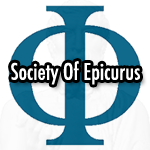Suavity is one of the key virtues of our tradition. It’s the art of kind, sweet speech that Epicurean friends were known for in antiquity.
Epicurus was critical of the sophistry of other philosophical schools: that ability to twist meanings and words, and to convince others even of untruths. There are times when philosophers use rhetoric to conceal Truth. Aristotle considered rhetoric to be part of the organon, the toolkit of the philosopher. But the Epicurean organon employed instead suavity.
True philosophy, Epicurus believed, is not about verbal ability. Epicureans hold Truth in high regard and always prefer the plain, concise, clear Truth over dishonest wordplay.
But sometimes the Truth can be difficult to swallow and, if not careful, we can easily seem cynical when acting in service of Truth. We must be mindful of the content of our character and the true purpose behind our words when we engage others in philosophical discourse, and even in trivial conversation.
Always tell the truth with kindness. Never lie with kindness, or tell the truth with bitterness. – Sai Baba
By always telling the truth with kindness, we encourage people around us to always be authentic, at ease in their own skin, mindful, and insightful. And so the art of suavity, the art of kindly telling the Truth, the art of wholesome communication, is an important virtue for us. Suavity can be active, even bold. In fact, it’s particularly necessary to employ suavity when informing others of severe Truths. A vaccine may be painful, but it’s necessary at times: so with words of Truth.
There are many ways of saying things. When we truly care about others, we should seek to give them insights that will help them to better themselves and to suffer less. Epicurus considered those who don’t tell us the Truth to be false friends: untruth is a sign of unfaithfulness.
Ancient Epicureans engaged in a system of mutual criticism, which evolved into a central aspect of the tradition. This system of mutual criticism is discussed at length by Norman W Dewitt in his piece titled Organization and Procedure in Epicurean Groups, where he explained how crucial this system is to Epicureanism as a practice, how it requires trust, and how one must learn to be humble and accept corrections.
Those that were more knowledgeable than others about the philosophy were expected to serve as mentors to newer Epicureans. These Guides were also expected to abide by a set of rules, to never abuse their status, to always employ suavity in their mentoring process, and they in turn had to answer to more senior Epicureans so that there were checks and balances.
Suavity seems to have been the social lubricant in this process. Suavity was part of Epicurean culture and of the very identity of an Epicurean. One of the tasks of every Epicurean is to cultivate suavity, to learn the ability to always tell the truth with kindness.
